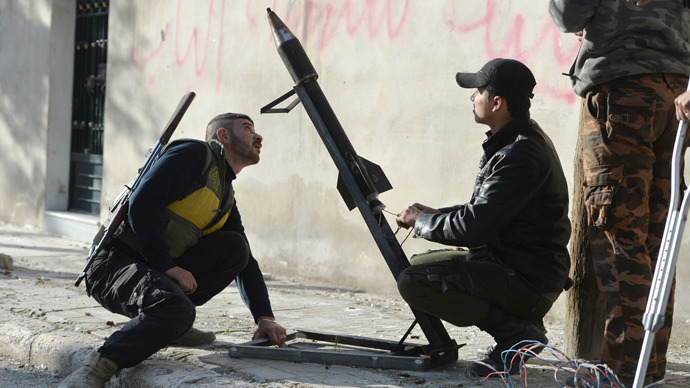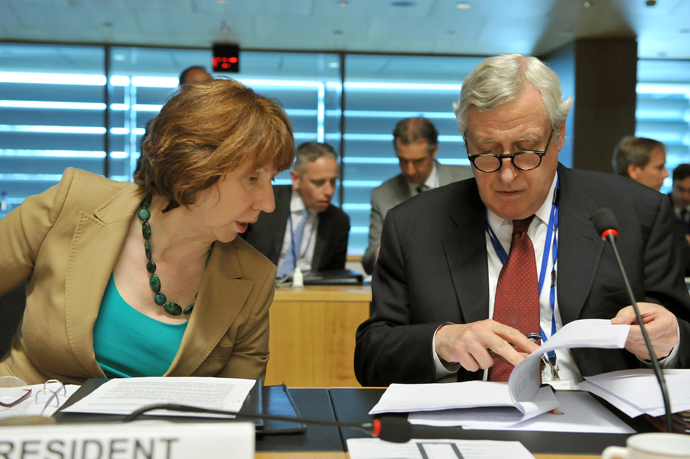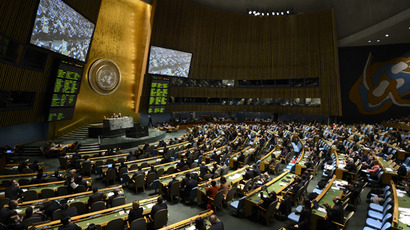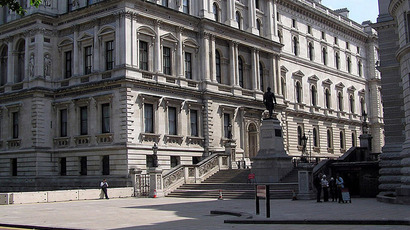EU eases Syria oil sanctions to assist rebels

EU governments have agreed to ease sanctions on Syria, allowing European importers to buy oil from the Syrian opposition. The move is aimed at EU countries providing a financial lifeline to rebels fighting Syrian government forces.
The European Union foreign ministers decided to ease the 2011 imposed sanctions on Syrian oil import during the Monday meeting in Luxembourg.
From now on, the European countries are allowed to buy oil from
Syria, but only if authorized by the Syrian National Coalition, an
opposition umbrella group.
"Anything that can help more resources to be available to people affected by the crisis of course is welcome," EU commissioner for humanitarian aid, Kristalina Georgieva, told Reuters.
Before the Monday meeting, the British Foreign Secretary William Hague said the decision will “send a signal that we are open to helping in other ways, in all the ways possible, including ways adding to the finances [of the opposition].”
The move is also an attempt to bolster the SNC’s credibility
among Syrians opposing the country’s President Bashar
Assad.
Easing sanctions is said to be aimed at giving the opposition a way to raise money for infrastructure repairs and creating local governance – as well as for purchasing arms.
But questions were raised whether the Monday decision would actually result in substantial economic gains for the Syrian opposition. Critics cited security concerns and battered infrastructure, preventing the European companies from taking any part in oil imports. The Syrian government is also expected to stand in the way of such attempts.

“[The removal of oil sanctions] is a largely illusory measure for the moment ,” Julien Barnes-Dacey of the European Council on Foreign Relations has said. “
The regime will do what it can, including using air power, to ensure they aren't able to channel oil out of the country .”
Monday's move comes in the footsteps of a failed campaign to
ease the Syrian arms embargo, which was led by Britain and France.
Several EU countries such as Germany, Austria and Sweden have
voiced their opposition to such a concession, fearing it would lead
to weapons falling into the hands of the region’s Islamist
militants.
Russian Foreign Minister Sergey Lavrov on Monday reminded that selling weapons to rebels would
violate international law, even if the embargo on weapons supplies
to Syria is ever lifted.
“The public lifting of this embargo, if it comes to this (and I say if, because there are more than few reasonable nations within the EU who have voiced their serious concern about such step) will still leave us with the international obligations of the EU nations banning the supplies of weapons and ammunition to non-state subjects,” Lavrov told media in Moscow.
Meanwhile, the Syrian opposition is to obtain some more palpable support from the US, following the Secretary of State John Kerry’s Saturday announcement of a boost in financial aid and “non-offensive military supplies” to the rebels. The US has officially been ignoring the requests to provide weapons and has refused to comment on reports of the CIA supplying arms to the militant groups in Syria through Turkish territory.
Lavrov and Kerry will discuss the EU decision on easing sanctions on Syria during their Tuesday meeting, the Russian Foreign Ministry said on Monday.
The Syrian war, which started as an uprising and has turned into a military stalemate for the country, has been going on for two years, and has claimed the lives of some 70,000 people.
The Syrian government refers to the opposition fighters as ‘terrorists’, while many Western countries consider them freedom fighters and question the legitimacy of President Assad’s regime.
The US has been a particularly staunch supporter of Assad’s overthrow, although it lists some of the Syrian rebel fighters groups as terrorist.
Russia has repeatedly urged for the violence in Syria to stop, stressing that a dialogue between the conflict’s sides must be established without precondition.
‘No government – no oil’
The Syrian opposition won’t be able to profit from the captured oil reserves, unless it comes up with an interim government, Osama Al-Qadi, general director of the Syrian economic task force under the umbrella of the opposition’s coalition, told Reuters following the EU decision.
“Without an interim government, nothing can be done now,” Al-Qadi, himself an SNC prime minister candidate, admitted, adding that the proposal of such government will be submitted for the coalition’s approval by the end of the month.
A provisional government would enable the opposition to oversee possible sales and sign contracts with countries like Turkey.
As a matter of fact, Turkey is the only country which could make it possible for the Syrian opposition to sell oil.
“There is no physical way to export oil from Syria except on trucks via Turkey – and that's if they manage to produce it,” one industry source said as quoted by Reuters.
So far, the opposition has not managed to set up control over the crude oil, and some of it is being smuggled from northeastern Syria.
‘European Union waving the flag of Al Qaeda’
Investigative journalist, Willy Van Damme the EU is
contradicting itself by helping the rebels.
“It is a blatant lie to say, look we are afraid of Al Nusra, we are
afraid of Al Qaeda but in reality one sees them arming and
financing and supporting Al Qaeda in Syria,” Van Damme told
RT.
Yet, the journalist argues that the EU still continues to recognize
Assad’s government because their label for the opposition as the
legitimate representative of the Syrian people “is meaningless
in diplomatic and in law” terms.
“So what they are doing is legalizing theft by an armed gang.
The European Union is waving the flag of Al Qaeda,” Van Damme
concludes.














